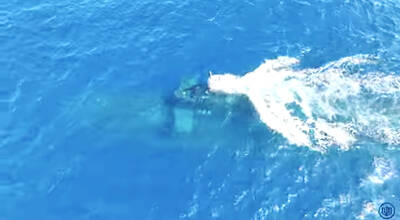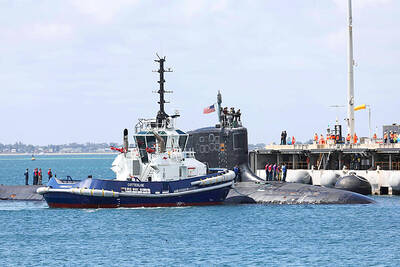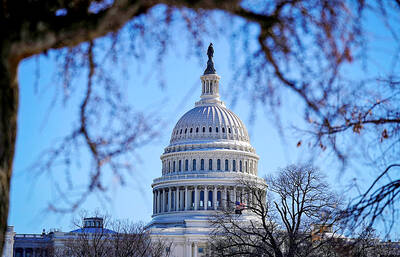Airline passengers traveling between Taiwan and the US and Canada will see a sharp drop in the weight limit for free baggage transport starting on April 15, the Civil Aeronautics Administration (CAA) said yesterday.
The CAA has approved airlines' request to reduce the free baggage allowance by 18kg from 64kg to 46kg.
Each passenger will be allowed to take two pieces of luggage for free transport, with each bag limited to 23kg, the CAA said.
Additional fees will be charged for excess or overweight baggage, it said.
In the case of China Airlines, passengers whose luggage exceeds 23kg will have to pay NT$800, with the weight limit for each piece of luggage set at 32kg.
Passengers who have more than two pieces of luggage will have to pay more than NT$3,000 for each extra bag.
First-class and business-class passengers will continue to enjoy preferential treatment.
EVA Airways spokesman Nieh Kuo-wei (聶國維) said that business-class passengers could still carry three pieces of luggage for free, the Chinese-language Apple Daily said.
However, the weight allowance was adjusted downward from a combined weight of 96kg to 87kg.
As for Deluxe-class passengers, they can carry two pieces of luggage, with a weight limit of 28kg for each piece, Nieh said.
He said that the baggage limit had been changed in response to rising fuel prices.
He said that the weight limit for domestic US routes had also been reduced to 23kg, and passengers may be charged extra when they travel on US routes if Taiwan did not adjust its baggage allowance.

CSBC Corp, Taiwan (台灣國際造船) yesterday released the first video documenting the submerged sea trials of Taiwan’s indigenous defense submarine prototype, the Hai Kun (海鯤), or Narwhal, showing underwater navigation and the launch of countermeasures. The footage shows the vessel’s first dive, steering and control system tests, and the raising and lowering of the periscope and antenna masts. It offered a rare look at the progress in the submarine’s sea acceptance tests. The Hai Kun carried out its first shallow-water diving trial late last month and has since completed four submerged tests, CSBC said. The newly released video compiles images recorded from Jan. 29 to

DETERRENCE EFFORTS: Washington and partners hope demonstrations of force would convince Beijing that military action against Taiwan would carry high costs The US is considering using HMAS Stirling in Western Australia as a forward base to strengthen its naval posture in a potential conflict with China, particularly over Taiwan, the Wall Street Journal reported on Saturday. As part of its Indo-Pacific strategy, Washington plans to deploy up to four nuclear-powered submarines at Stirling starting in 2027, providing a base near potential hot spots such as Taiwan and the South China Sea. The move also aims to enhance military integration with Pacific allies under the Australia-UK-US trilateral security partnership, the report said. Currently, US submarines operate from Guam, but the island could

RESTRAINTS: Should China’s actions pose any threat to Taiwan’s security, economic or social systems, China would be excluded from major financial institutions, the bill says The US House of Representatives on Monday passed the PROTECT Taiwan Act, which states that Washington would exclude China from participating in major global financial organizations if its actions directly threaten Taiwan’s security. The bill, proposed by Republican Representative Frank Lucas, passed with 395 votes in favor and two against. It stipulates that if China’s actions pose any threat to Taiwan’s security, economic or social systems, the US would, “to the maximum extent practicable,” exclude Beijing from international financial institutions, including the G20, the Bank for International Settlements and the Financial Stability Board. The bill makes it clear that China must be prepared

Taiwanese trade negotiators told Washington that Taipei would not relocate 40 percent of its semiconductor production to the US, and that its most advanced technologies would remain in the nation, Vice Premier Cheng Li-chiun (鄭麗君) said on Sunday. “I told the US side very clearly — that’s impossible,” Cheng, who led the negotiation team, said in an interview that aired on Sunday night on Chinese Television System. Cheng was referring to remarks last month by US Secretary of Commerce Howard Lutnick, in which he said his goal was to bring 40 percent of Taiwan’s chip supply chain to the US Taiwan’s almost